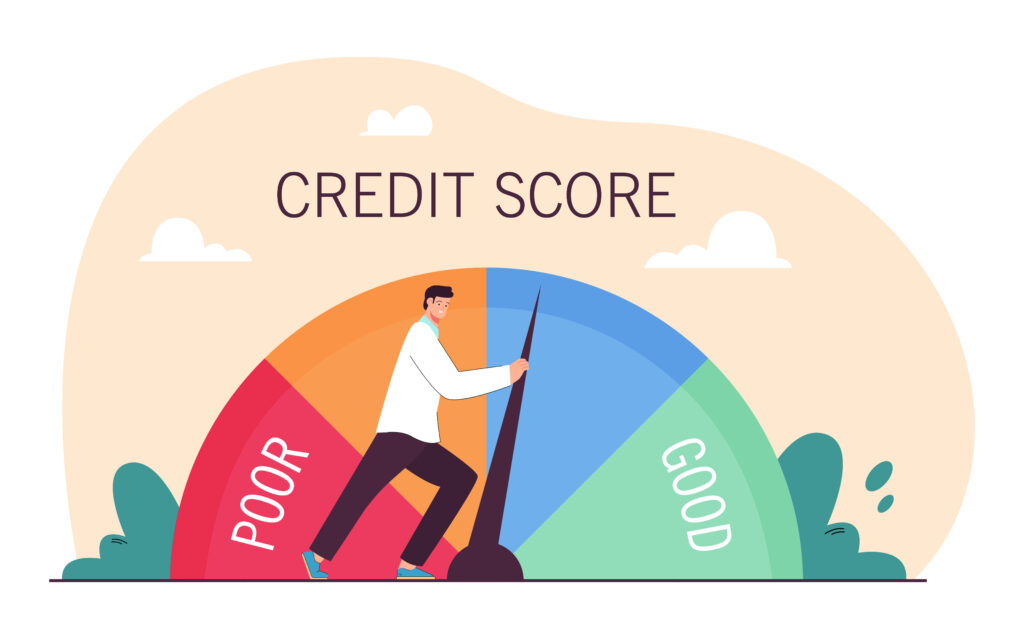
Businessman pushing credit score speedometer from poor to good. Tiny person improving personal credit history with efforts flat vector illustration. Business reputation of customer, loan concept
Your credit score serves as a crucial reflection of your overall financial reliability. Whether you’re planning to apply for a personal loan, home loan, car loan, or even a new credit card, lenders look at your credit score to determine how trustworthy and financially responsible you are. A high credit score opens doors to better interest rates and quick loan approvals, while a low score can block your financial progress.
If you’ve recently noticed a dip in your credit score, it’s essential to understand why it’s happening. In this blog, we will discuss the top reasons why your credit score may be falling, how each factor impacts your score, and the steps you can take to fix and improve it.
What Is a Credit Score?
A credit score is a 3-digit number, typically ranging from 300 to 900 in India, calculated by credit bureaus such as CIBIL, Experian, CRIF Highmark, and Equifax. A score closer to 900 indicates excellent creditworthiness. Generally:
-
750+ is considered excellent
-
700–749 is good
-
650–699 is average
-
Below 650 is considered poor
Any downward movement in this score can impact your ability to borrow and the terms you get. Let’s explore the factors that can cause a sudden drop in your credit score.
1️⃣ Missed or Late Payments
One of the most common and damaging reasons for a falling credit score is missed or delayed payments. Whether it’s a credit card bill or EMI on a personal loan, even a single missed payment can negatively impact your score.
Why It Hurts:
-
Payment history accounts for 35-40% of your credit score.
-
Payments more than 30 days late are usually reported to credit bureaus.
-
Late payments remain on your credit report for up to 7 years.
Solution:
-
Set up payment reminders via SMS or apps.
-
Use auto-debit to ensure timely EMIs or card dues.
-
Even if you can’t pay in full, always pay at least the minimum due.
2️⃣ High Credit Utilization Ratio
The credit utilization ratio measures how much of your total credit limit you’re using, and lenders often view usage above 30% as a sign of potential financial risk.
Example:
If you have a credit card with a ₹1,00,000 limit and you spend ₹80,000, your utilization is 80%—which is very high.
Impact:
-
Suggests you’re over-reliant on credit.
-
Reduces your score even if you pay on time.
Tips to Improve:
-
Try to keep your utilization below 30%.
-
Increase your credit limit (if you qualify).
-
Use multiple cards responsibly to spread the balance.
3️⃣ Too Many Credit Applications in a Short Time
Each time you apply for a credit product, a hard inquiry is made by the lender. While one or two are fine, multiple inquiries within a short period signal desperation for credit.
Why It Affects Your Score:
-
Hard inquiries stay on your report for up to 2 years.
-
Too many applications can reduce your score by 5 to 10 points per inquiry.
Fix:
-
Avoid applying for multiple loans or credit cards at once.
-
Use platforms that offer pre-approved offers without affecting your score.
-
Wait at least 6 months between credit applications.
4️⃣ Loan Default or Credit Card Settlement
Failing to pay your dues or opting for a loan settlement with your lender can severely damage your credit profile.
What Happens:
-
A “settled” status is worse than “paid in full.”
-
Defaults are reported to credit bureaus.
-
Score can drop by 100+ points.
Recovery Tip:
-
Try to repay loans in full.
-
If you’ve already defaulted, consider taking a small secured loan and repay it on time to rebuild your score.
5️⃣ Closure of Old Credit Accounts
While it might seem wise to close unused cards or old loans, doing so can negatively impact your credit history length and utilization ratio.
Negative Effects:
-
Shortens your average account age.
-
Reduces total available credit, increasing utilization ratio.
Advice:
-
Keep old accounts open if they don’t have an annual fee.
-
Use them occasionally to keep them active.
6️⃣ Inaccuracies in Credit Report
Even if you’re financially responsible, errors in your credit report can lower your score. These may include:
-
Incorrect account balances
-
Wrong personal information
-
Duplicate entries
-
Fraudulent accounts opened in your name
What You Should Do:
-
Check your credit report at least once every 6 months.
-
Use sites like CIBIL, Experian, CRIF to download your report for free.
-
Dispute errors by raising a complaint with the bureau.
7️⃣ Becoming a Loan Guarantor or Co-Signer
If you have co-signed or guaranteed someone else’s loan, their repayment behavior directly affects your credit score.
Risk Factors:
-
If the borrower delays or defaults, your score takes a hit.
-
You become legally responsible to repay if they fail.
Safety Tip:
-
Only co-sign if you fully trust the borrower’s financial behavior.
-
Regularly monitor the loan account for timely repayment.
8️⃣ Overdependence on Credit
Using credit cards for everything—even daily expenses—can make you appear credit hungry. Lenders see this as risky behavior.
Signs of Overdependence:
-
Using 80-90% of your credit limits.
-
Revolving credit card debt every month.
-
Taking small loans frequently.
Recommendations:
-
Use debit cards or UPI for smaller purchases.
-
Maintain a healthy mix of credit (secured and unsecured).
-
Pay off balances in full whenever possible.
9️⃣ Change in Credit Mix
Your credit mix refers to the types of credit you hold—secured (like home/car loans) and unsecured (credit cards/personal loans). A shift in this balance, especially too many unsecured loans, can lower your score.
What To Do:
-
Maintain a balanced credit portfolio.
-
Don’t rely solely on personal loans or credit cards.
🔟 Inactive Accounts
Oddly enough, not using credit at all can also be harmful. Inactivity leads to:
-
Closure of accounts by the issuer.
-
Shortening of your credit history.
-
Reduced credit exposure.
Prevention:
-
Use your cards at least once every few months.
-
Make small purchases and repay promptly to keep the account active.
Final Thoughts
Your credit score is not just a number; it’s a reflection of your financial habits. A falling credit score can create unnecessary barriers in your financial journey. But the good news is: you can fix it.
Quick Recap of Reasons Why Your Credit Score May Be Falling:
-
Late or missed payments
-
High credit utilization
-
Too many credit inquiries
-
Loan defaults or settlements
-
Closure of old credit accounts
-
Errors in credit reports
-
Co-signing or guaranteeing risky loans
-
Overuse of credit
-
Poor credit mix
-
Inactive credit accounts
How to Monitor and Improve:
-
Regularly check your credit score on platforms like CreditMantri, CRED, Wishfin, or Paisabazaar.
-
Pay bills on time.
-
Use credit responsibly.
-
Keep your credit report clean and updated.







